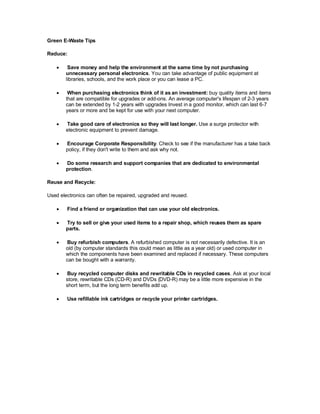Ewaste Tips
- 1. Green E-Waste Tips Reduce: ï· Save money and help the environment at the same time by not purchasing unnecessary personal electronics. You can take advantage of public equipment at libraries, schools, and the work place or you can lease a PC. ï· When purchasing electronics think of it as an investment: buy quality items and items that are compatible for upgrades or add-ons. An average computer's lifespan of 2-3 years can be extended by 1-2 years with upgrades Invest in a good monitor, which can last 6-7 years or more and be kept for use with your next computer. ï· Take good care of electronics so they will last longer. Use a surge protector with electronic equipment to prevent damage. ï· Encourage Corporate Responsibility. Check to see if the manufacturer has a take back policy, if they don't write to them and ask why not. ï· Do some research and support companies that are dedicated to environmental protection. Reuse and Recycle: Used electronics can often be repaired, upgraded and reused. ï· Find a friend or organization that can use your old electronics. ï· Try to sell or give your used items to a repair shop, which reuses them as spare parts. ï· Buy refurbish computers. A refurbished computer is not necessarily defective. It is an old (by computer standards this could mean as little as a year old) or used computer in which the components have been examined and replaced if necessary. These computers can be bought with a warranty. ï· Buy recycled computer disks and rewritable CDs in recycled cases. Ask at your local store, rewritable CDs (CD-R) and DVDs (DVD-R) may be a little more expensive in the short term, but the long term benefits add up. ï· Use refillable ink cartridges or recycle your printer cartridges.
